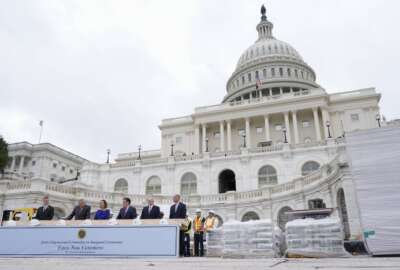What happens when MLK Day and Inauguration Day fall on the same day?
The concurrent federal holidays differ from what federal employees saw for the previous Inauguration Day in January 2021.
For federal employees near Washington, D.C., the upcoming Inauguration Day will look a little different, since the Jan. 20 federal holiday coincides with another federal holiday: Martin Luther King Jr. Day.
Even though Inauguration Day and MLK Day are two separate federal holidays, they fall on the same day this year. Despite that, federal employees will still get just one day off to observe the two holidays concurrently, the Office of Personnel Management clarified in a Tuesday memo to agencies.
When a federal holiday falls on a weekend, OPM will often set an in-lieu-of holiday where the federal holiday is observed on a workday immediately preceding the actual day of the holiday. But in this case, OPM confirmed there is no additional day off beyond the one federal holiday on Jan. 20.
General Schedule employees who do work on Jan. 20, excluding Senior Executive Service employees, are eligible for holiday premium pay, OPM said.
The concurrent federal holiday differs from what federal employees saw for the previous Inauguration Day in January 2021. At the time, many feds saw a three-day work week, with Monday off for MLK Day and Wednesday off for Inauguration Day.
Overlapping holidays can occasionally happen since each federal holiday is set in a different way. Each Inauguration Day is specifically set for Jan. 20, with the incoming president being sworn in at noon, eastern time, on that day. The MLK Day federal holiday takes place on the third Monday of January each year. The last time Inauguration Day and MLK Day fell on the same date was in 1997 for President Bill Clinton’s second term.
This year, however, there is still an extra federal holiday in January. Federal agencies and offices will be closed on Jan. 9 to honor the passing of President Jimmy Carter.
Pay, benefits for appointees resigning on Inauguration Day
In the same memo, OPM also detailed the standard procedures for how pay, leave and benefits will work for noncareer appointees who will be resigning on Inauguration Day.
For resigning noncareer appointees, the midday timing for the swearing-in ceremony means any hours worked up until noon on Jan. 20 should be paid, OPM said.
“Each agency is responsible for determining the number of hours of pay for each noncareer appointee based on the employee’s work schedule for that day, prior to the termination of their appointment at noon,” OPM Associate Director for Workforce Policy and Innovation Veronica Hinton wrote in the memo.
Accrued leave hours for resigning appointees will depend on their position. Those who are covered by Title 5 — such as noncareer employees on the General Schedule and in the SES — will not accrue leave hours for the Jan. 12 pay period, since they won’t be working throughout the full pay period.
But there may be other political appointees not covered by those leave systems and without a scheduled tour of duty. OPM determined that they should still receive a half day of pay for Jan. 20, since the swearing-in ceremony is expected to take place at noon.
Unlike accrued leave for most appointees, health benefits will continue as usual until the end of the next pay period on Jan. 25, OPM said. Individuals can then get a 31-day extension of health coverage through the Federal Employees Health Benefits program at no charge. Beyond that, FEHB coverage can be extended for up to a year and a half, as long as the enrollee pays the full premium and a 2% administrative charge.
Per the standard rules, resigning appointees will also be credited for a full day of work toward their retirement benefits for a partial workday, OPM said.
Copyright © 2025 Federal News Network. All rights reserved. This website is not intended for users located within the European Economic Area.
Drew Friedman is a workforce, pay and benefits reporter for Federal News Network.
Follow @dfriedmanWFED






